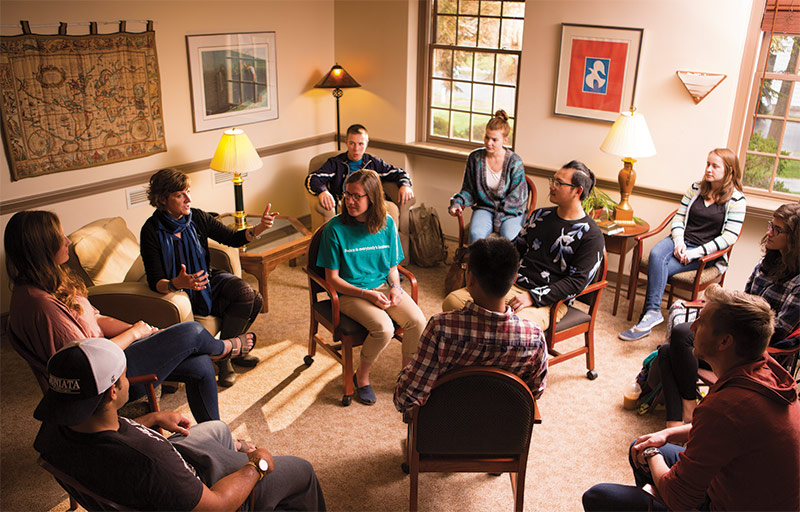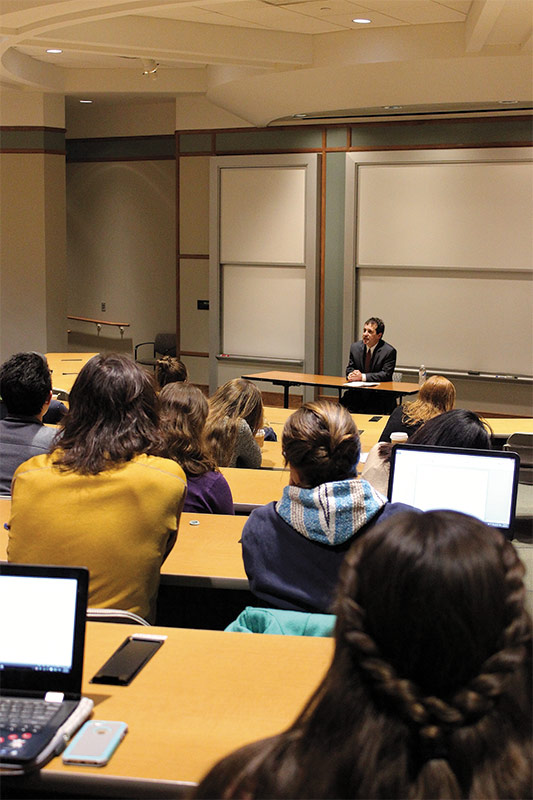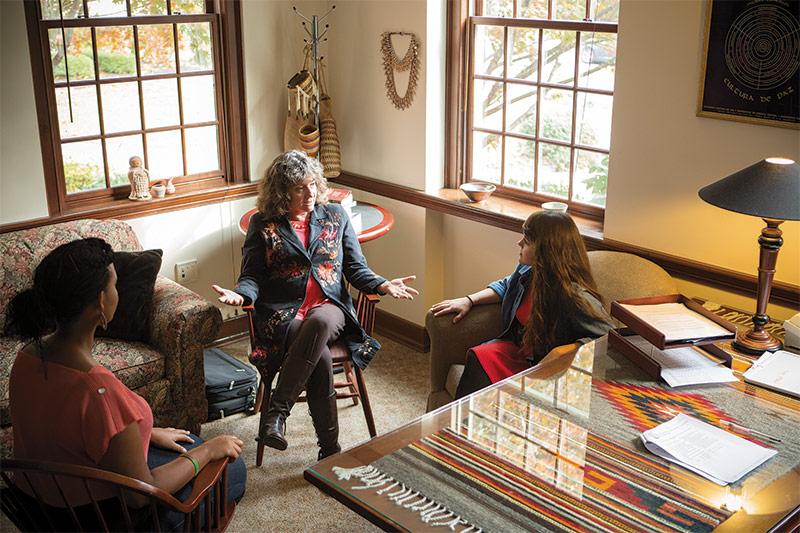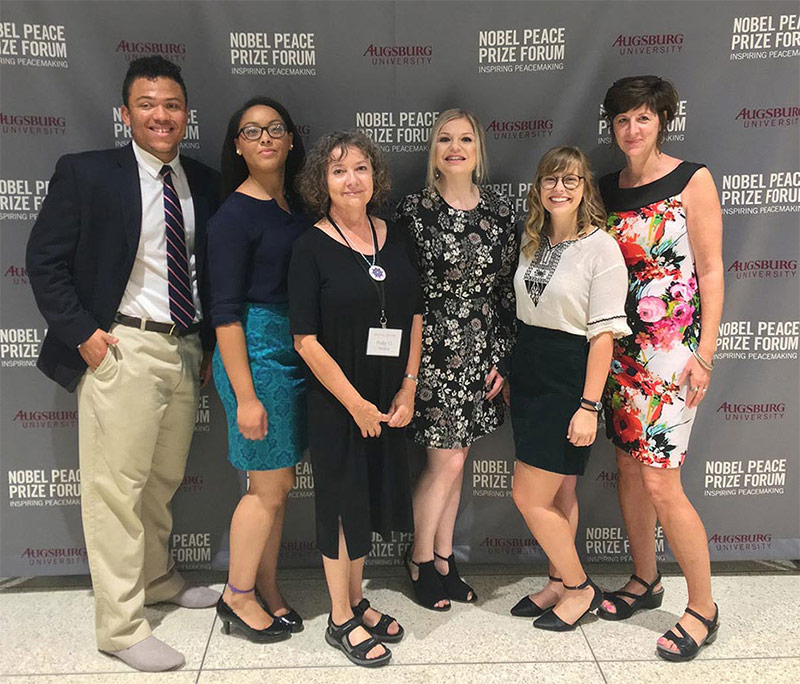The Baker Institute for Peace and Conflict Studies was launched in 1971 through the persistence and vision of Elizabeth Evans Baker. Her generous gift to Juniata established an endowment to fund her dream of sowing peace through education. The Baker Institute began with a few classes and grew exponentially in the years to come to include visits from renowned speakers, the sponsorship of peace-inspired activities and experiences for students, and the 14-acre Peace Chapel, designed by Maya Lin, the architect of the Vietnam Veterans Memorial in Washington, D.C.
The Peace and Conflict Studies (PACS) program was also born of The Baker Institute. Launched in the fall of 1974, the program’s curriculum encourages students to study the roots and sources of conflict and, in so doing, increase their awareness of nonviolent solutions.
The PACS program is one of 44 undergraduate peace and conflict studies programs in the United States, but not all grant degrees in peace and conflict studies. In addition to being housed in an Institute with a mission to support students studying PACS, Juniata’s program is global, with 10 percent of its students coming to the College from other nations. Since its founding, the Baker Institute has partnered with students who have taken courses, interned, and volunteered in ways that have given them deeper understandings of justice and helped them to develop sustainable methods of conflict resolution.
Students choose to study PACS for differing reasons, but most feel a deep calling to make a positive impact in the world around them. Savannah Parson ’18 of Slippery Rock, Pennsylvania, is driven by that passion.
“With all of the work I’ve done, I’m realizing that I may not need to know exactly what place I will be or what work I will be doing. I do know I will be fulfilling what I initially wanted to do with my degree: to make an impact.”Savannah Parson ’18, Slippery Rock, Pa.
Parson designed her education by writing a custom Program of Emphasis (POE) combining PACS and sociology with a secondary emphasis in gender studies. In her educational journey, Parson has included experiences to learn about the people and places around her. She helped teach a course to inmates within a local prison and spent the summer interning with a refugee resettlement agency in Pittsburgh, Pennsylvania.
Thanks to funds from The Baker Institute, Parson also spent three weeks during summer 2017 at an intensive non-violence training in Seattle, Washington, through the Fellowship of Reconciliation (FOR). She also recently attended the Peace and Justice Studies Conference with members of the PACS department, where she met with Matt Meyer, the national co-chair of FOR. The duo talked about FOR and Parson was able to have meaningful dialogue with the person at the helm of organizing the training.
“Having done these things makes me comfortable in knowing I can do more,” said Parson. “People continue to ask for things to get done once they see you can do them.” Parson serves as the president of the student peace organization, PAX-O, sits on the advisory board for The Baker Institute, and has chaired Juniata’s Genocide Awareness and Action Week (GAAW).
Equipped with a self designed education, an impressive resume, and a soul for peace and justice, Parson knows that she will be able to forge a career based on her mission.
“With all of the work I’ve done, I’m realizing that I may not need to know exactly what place I will be or what work I will be doing,” Parson says. “I do know I will be fulfilling what I initially wanted to do with my degree, to make an impact.”
Celia Cook-Huffman, Burkholder Professor of Conflict Resolution and assistant provost, hopes that all students who go through the PACS program live out their passions through their vocations. Every day, she empowers students to understand other people’s personal experiences who may live vastly different lives.
“Whatever their careers might be, I hope they are critical thinkers about justice and equity,” Cook-Huffman says. “I hope they are change agents in the world and that they make changes in ways they believe are important.”
Since graduating from Juniata in 2011, Lily Kruglak has earned her master’s degree in conflict resolution from Georgetown University, and has traveled extensively in her work as a reporting and outreach coordinator with Resolve Network, where she helps to facilitate grassroots peacebuilding, conflict resolution, and mediation.
At the 2017 Peace and Justice Studies Association’s annual conference, which Parson and other Juniata students attended, Kruglak was honored with the Next Generation Peacemaker Award for her leadership and vision in the pursuit of peace.
The award honors skills that Kruglak cultivated while at Juniata. After studying in Rwanda during her junior year, Kruglak returned to Juniata determined to share what she learned. So, she rallied other students and created Genocide Awareness and Action Week, a week of speakers, activities, and hands-on learning experiences designed to raise awareness about genocide prevention and intervention. It is still held annually and supported collaboratively across campus. In 2017, GAAW was co-sponsored by The Baker Institute, the dean of students office, the provost’s office, the history, politics, and international studies departments, and PAX-O.
“I’m so incredibly humbled it continues and that it’s embraced by students. I try to visit as often as I can for it,” Kruglak said. The event continues to expand and diversify. Last year, Parson added a mural-creation aspect to the week with the purpose of using the arts to advance the message of peacemaking.
“As a young activist, I often had a knee-jerk reaction to issues, but the PACS program at Juniata taught me to think about social issues in a more sophisticated way.”Andrew Loomis ’92, Washington D.C.
Andrew Loomis ’92 of Washington, D.C., often returns to Juniata to speak about his experiences. After graduation, Loomis earned a master’s degree and doctorate. He worked at universities, nonprofit organizations, and think tanks in Washington, D.C., before going into government work.
He served as the deputy director of an operations team at the U.S. Department of State in the Bureau of Conflict and Stabilization Operations. There, Loomis conducted efforts to reduce violence around the world. He currently is the director of external relations in the office of the Under Secretary for Public Diplomacy and Public Affairs. In this role, Loomis works with Congress and academic institutions to increase understanding and engagement of foreign policy.
“I wanted to use my skills and knowledge from Juniata to work directly on policy issues,” Loomis says. “I feel like that’s where I have the most impact.”
Loomis credits his alma mater for inspiring his deep thinking about matters. “As a young activist, I often had a knee-jerk reaction to issues, but the PACS program at Juniata taught me to think about social issues in a more sophisticated way,” he says.
Polly Walker, director of The Baker Institute and Elizabeth Baker Evans Professor of Peace and Conflict Studies, encourages her students to be inspired by Loomis—to be reflective, find something they are passionate about, and merge it into their studies. “Contemplate on what’s happening in the world, what needs to be changed, and how to get involved in that,” Walker says.
PACS students are involved and continue to evolve how they engage. Sarah Ullom-Minich ’18, of Moundridge, Kansas, studied abroad in Ecuador as part of her PACS journey. There, she lived in a rural community with sugarcane farmers, which gave her a deeper understanding of the importance of equality and how it can transform relationships. A Peace Fellowship offered by The Baker Institute made her trip possible.
“I was able to stay in Ecuador over the summer—my housing, food and materials for this incredible experience were paid for and I’m now extrapolating my experiences into my senior thesis,” said Ullom-Minich. She is hoping the knowledge she gained will be a catalyst to securing a Fulbright Scholarship. Her application is already complete.
Newcomers to PACS are also recipients of benefits that make travel possible. First-year student Deon Mendez ’21 of Pembroke, New Hampshire, already attended this year’s Nobel Peace Prize Forum, which he did with a few other Juniata students and faculty. The committed peacemakers who gave presentations, led breakout sessions, and presented dialogue at the Forum inspired Mendez.
“It’s an amazing privilege to walk on this journey with our students as they grow and develop a different sense of who they are.”Celia Cook-Huffman, W. Clay & Kathryn H. Burkholder Professor of Conflict Resolution and assistant provost
“It completely transformed me and gave me great inspiration as to what I can aspire to be,” Mendez says. “The opportunities that the Baker Institute provides for students foster incredible learning and personal growth.”
It’s safe to say that Elizabeth Evans Baker would be proud of the far-reaching effects that her dream has had on students, alumni, and those they encounter. Faculty and staff have continued to build on her vision as they partner with students, empowering each to become a positive force in the world.
“It’s an amazing privilege to walk on this journey with our students as they grow and develop a different sense of who they are,” Cook-Huffman says.
PACS alumni are thankful for the opportunity to have been on the same path with their professors, to engage as agents of change in those conflicts citizens hear about on a daily basis.
“I’m a believer in Juniata’s efforts to equip people to be thoughtful and engaged citizens,” Loomis says. “An important step along the way of engagement is to make a difference. Juniata can give you the pieces and tools to have a real impact in the world.”
“It completely transformed me and gave me great inspiration as to what I can aspire to be.”Deon Mendez ’21, Pembroke, N.H.











